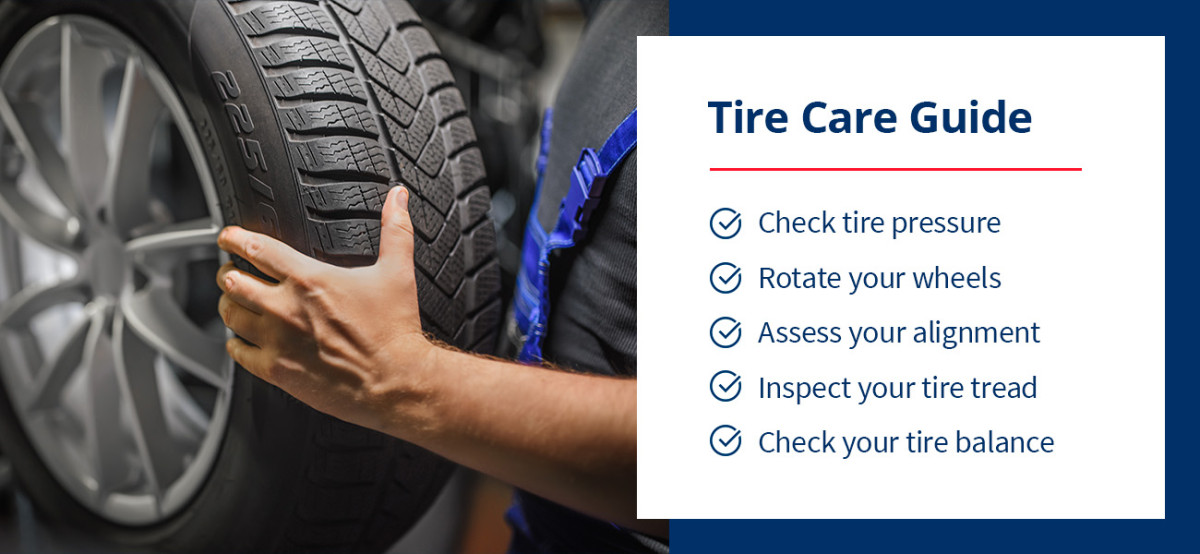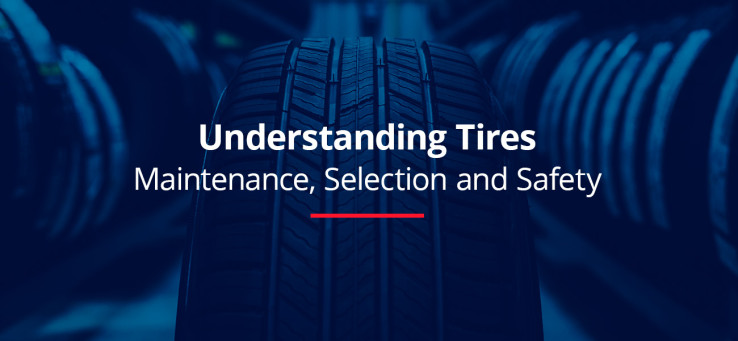Understanding tires can empower you to be safer on the roads, from selecting the right tire for your vehicle to maintaining them and knowing when you need replacements. Discover everything you need to know about choosing and maintaining tires so you can enjoy safer journeys in the future.
Tire Selection
The average set of tires lasts between six and 10 years. The exact amount of time will depend on a range of factors, such as your driving habits, wheel alignment and the quality of your tires. Since your tires will last several years, it's worth investing time and effort into their selection. Our short tire selection guide will highlight what you need to consider.
Vehicle Specifications
The first consideration when choosing tires is to review your wheel specifications. You can generally find this information in your owner's manual and it will detail the following:
- Tire width: The distance from sidewall to sidewall.
- Aspect ratio: The ratio of the tire's height to width.
- Wheel diameter: The height of your wheel.
- Speed rating: The maximum speed you can travel, provided you are not carrying an abnormal load.
- Load index: The total weight your tires can carry safely.
Professionals at AAA approved auto repair shops can assist you in identifying your exact tire specifications.
Weather Conditions
While most parts of the United States experience four seasons, some states have more extreme summers and winters. For example, summer tires may be a good option in hotter climates. Winter tires have a deeper tread, making them ideal for states with high volumes of snow and ice during winter.
All-season tires combine features of both summer and winter tires, making them a good choice for those living in more moderate climates.
Type of Terrain
City streets and farm roads are distinctly different terrains and require the appropriate tire features. People who drive predominantly in busy cities should consider tires with superior braking distance. In contrast, off-road driving will require tires with greater traction.
When choosing your tires, consider the routes you travel most frequently. If you like to adventure off the beaten track on the weekends, factor this into your decision.
Tire Maintenance Tips

Replacing tires comes with a significant cost — ensure you get the most value from your wheels with frequent maintenance. Use our brief tire care guide to remember what to check:
- Tire pressure: Over- or under-inflated tires can impact their longevity and pose a safety risk. Use a tire gauge to check the pressure at least once a month and inflate your tires accordingly.
- Rotate your wheels: Your front tires absorb more impact when braking, leading to faster wear. Rotate your tires every 5,000 to 8,000 miles to ensure equal tread consistency.
- Assess your alignment: It's good practice to check your alignment at a reputable auto repair shop periodically. If your vehicle is pulling to one side or your tires show uneven wear, get an automotive service professional to assess your alignment immediately.
- Inspect your tire tread: Tires that become smooth or show signs of irregular tread will have less traction. Position a penny upside down in the tread and check if Lincoln's head is visible. If you can see his entire head, it's time to replace your tires.
- Check your tire balance: A balanced tire and wheel assembly are crucial for smooth driving. Refer to your owner's manual to see how often you need to check your tire balance.
These tire safety tips are an effective way to ensure safer journeys.
Safety Considerations
Even if you travel the same route every day, fluctuating traffic and weather conditions can present different safety risks. Take note of some of the best practices for safer driving.
Slow Down in Wet Weather
Just as we struggle to maintain our balance on a wet floor, our cars experience less grip on wet roads. Decrease your speed to allow more of the tire's surface area to connect with the road and improve traction.
It's also advisable to avoid puddles on the road to reduce the chance of hydroplaning. Maintaining a safe distance between vehicles will further enhance your safety.
Avoid Overloading Your Vehicle
Your owner's manual and the sticker inside the driver's door will display your vehicle's maximum load — ensure you stick to this.
Overloading your vehicle will put more weight on your tires, increasing their overall temperature. When tires become hot, there is a higher risk of increased wear and tear or a blowout.
Inspect Your Car Before a Long Trip
While it's good practice to check your tires frequently, it's even more crucial to inspect them before longer journeys. More time on the roads will put additional stress on your tires, increasing the likelihood of automotive issues. Finding a reputable auto repair shop in unfamiliar areas may also be challenging.
Inspecting your tread, tire pressure and alignment ahead of your trip will help ensure greater peace of mind.
Frequently Asked Questions
You now have the basics of how to select a tire as well as some relevant car tire tips. Here are some final questions and answers to consider before you belt up.
How Can You Tell if a Tire Is Good Quality?
Quality tires often come with a higher price tag. Check how the cost of your tire replacement compares to others on the market.
You can also check the National Highway Traffic Safety Administration (NHTSA) guidelines to determine the safety specifications for popular tires.
How Do I Make Sure My Tires Are Safe?
Tire safety begins with choosing the correct tire for your vehicle. Conducting monthly tire inspections and regular car services with a professional auto service provider helps to maintain road safety.
What Should You Ask When Buying Tires?
The first question you should ask is if your current tires are the best match for your vehicle. Other things to check with tire dealers include:
- The mileage you can expect from your new tires.
- The safety certifications of specific brands.
- The best tire type for your terrain and climate.
Embark on Safer Journeys With AAA Central Penn
Tires are integral to your safety on the roads. For optimal peace of mind, choose the best tires for your vehicle and follow a regular maintenance schedule.
AAA Central Penn makes it their mission to provide superior auto insurance for your car and budget. By becoming a member with us, you also benefit from services such as driver training and free battery tests! Contact our team today to learn more about our automotive services. We look forward to helping you make safety a top priority!


